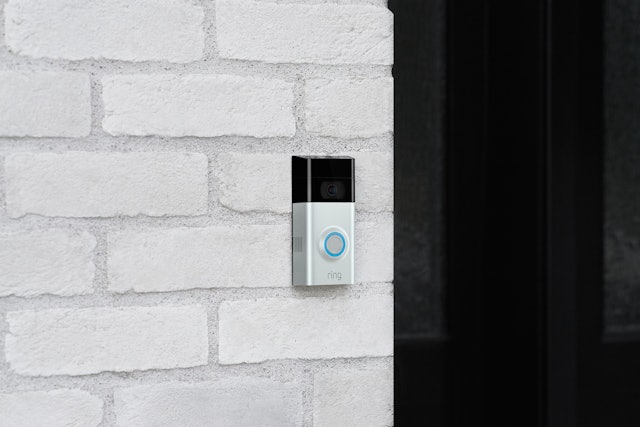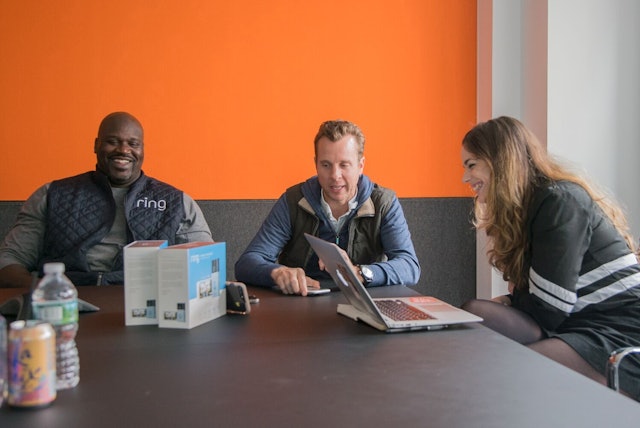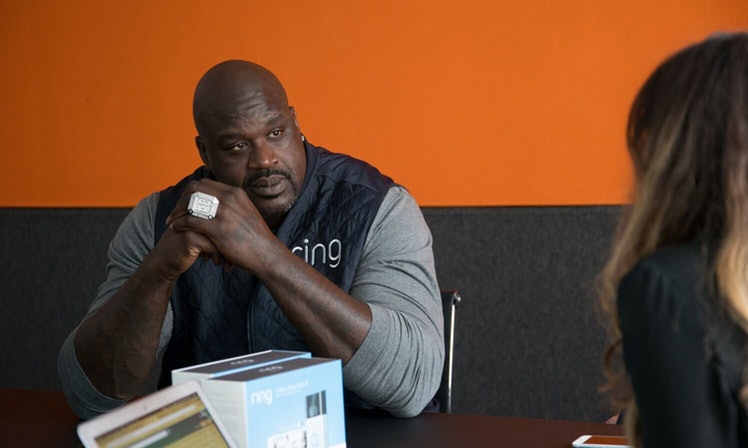Your online order is at risk of being stolen right off your front door step. Shaq and Ring want to help. RING — the company that revolutionized home security with the video doorbell — was completely organic. The Big Fella endorses the product because he loves it, not because he’s paid to. Convenient Right! Ring’s founder and chief executive, Jamie Siminoff says “Imagine searching for the perfect means of marketing your product, racking your brain and Rolodex, making cold call after cold call… and then Shaq arrives at your doorstep, already obsessed with your mission. If the story feels a bit like the last 30 minutes of the film Serendipity, it’s because it kind of is. Let me explain.
Ring on YouTube
“So when I move to my new house, I’m at Best Buy picking up TVs and stuff and I see this Ring thing. I think, let me try it. It worked beautifully and it was affordable.” So, of course, Shaq went back the next day and bought some more. He did “his whole house, around 25 cameras, and it only cost $3,000.” Not only is Ring’s price tag 20 times less than any of its competitors’, according to Shaq, it apparently works better too. “If a fly goes across the sensor, I get a call,” he tells me, “a fly.”

The meeting showed them that they share a common ideology: Safety isn’t a privilege; it’s a right. “Our goals as a company are not around revenue, I mean obviously we are a for-profit company and so we hope that by doing the right thing that it comes back and people want to use the product… But at the same time, we want that to be a factor for everyone. And so it’s really about protecting the whole neighborhood not just about the end customer…” Siminoff explains before Shaq interrupts, praising his friend who won’t do it himself, “He does a lot in the community. He actually gave over $2 million worth of product — just gave it away — to people who are less fortunate. We handed them out in Boston, in Atlanta… He doesn’t like talking about it but I just have to brag for him.” A slightly bashful Siminoff adds, “If you’re going to try to make neighborhoods safer, it has to be all neighborhoods. It has to be for all.”

The evolution of technology has certainly made affordable price points for products like these more feasible. A comprehensive security system doesn’t (and absolutely shouldn’t) cost $60,000 anymore. Safety can’t be a class issue, especially when the places that need it most are often the ones that can’t afford it. With Ring, security is more accessible; you can even do everything from your phone. Imagine answering your home doorbell, miles away, while at work. Imagine being able to communicate directly with (read: scream at) the grainy figure in your driveway at 4 a.m. who’s testing to see if your car is locked from the comfort of your own bed. These “luxuries” aren’t out of the average person’s reach in 2017.
But, of course, with that same evolution comes new territory in the security world, particularly in the age of online shopping. And that’s what brings Shaq and Siminoff in front of me today. “Cyber Monday is upon us,” Siminoff warns eerily. While we’ve all heard the risks Black Friday has to offer (hello being trampled in lines), Cyber Monday remains relatively untrodden ground for many of us. In 2015, 23 million Americans had packages stolen from their doorsteps. Combine that with the steadily rising average value of these packages, and you have a considerable problem. Package theft has become a standard risk when cashing out your online shopping cart.
ABC News on YouTube
That’s why the people at Ring invented their own holiday, timed for the most common delivery days following our big ticket purchases on Cyber Monday. National Package Protection Day, held on the Wednesday following Cyber Monday (November 29, this year) is dedicated to making sure your brand new TV, laptop, or speaker system, etc. doesn’t end up under someone else’s tree. The “holiday” may be new, but the trend that necessitated it is very real. The premise here is that petty theft is a gateway crime and cracking down on it will discourage any more dangerous or serious crimes.
Ring’s ultimate goal is to recreate a collective sense of community absent from many modern neighborhoods. It wants us to return to the neighborhood ideal, in which people communicate and look out for one another rather than cohabitate in silence. Its app, which is now accessible to people who don’t have Ring as well those who do, incorporates a social layer to encourage just that. People in the community can send messages to one another and share reports, “We create these sort-of larger rings of security. Maybe a neighbor can’t afford it or doesn’t have it. It’s really about the neighborhood for us, not the person who bought the actual product.” And the results, Siminoff says, speak for themselves, “I’d say over hundreds of arrests.” He receives new videos of interrupted crimes every day (and I have to say they’re fun to watch), “We did this study with the LAPD where we put Ring in just 10 percent of homes in a neighborhood and we reduced crime by over 55 percent” over a 6-month period. That’s no laughing number.
So when I tell you Shaq is here to save you, I’m being serious. He wants to remind you to guard your packages and look out for your fellow neighbor. He’s here to shout from the rooftops that feeling safe in your own home shouldn’t cost more than what an average American makes in a year. He doesn’t wear a cape, but he does have a badge, and holds law enforcement titles from a few different states. And, yes, in case you were wondering, at 7’1″, Shaq does hold some county records for being the tallest member on the force. That’s why I always say, “If Shaq can’t save us, no one can.”

